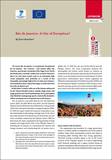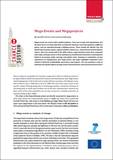Protests in Brazil: Chance2Sustain researcher Einar Braathen on the issue of mega-events
Brazil – the revolt as (anti-) mega event
By Einar Braathen and Celina Sørbøe, Norwegian Institute for Urban and Regional Research The Chance2Sustain opinion piece ‘Rio de Janeiro: a city of exception?’ was written earlier this year and suggests that the World Cup 2014 and Olympics 2016 may be the most contested and politicized in the history of mega sports events.
One year before the FIFA World Cup, the Confederations Cup has triggered the largest mass protests Brazil has seen in decades. On June 20, 2013 at least one million people took to the streets in Rio de Janeiro during what is now called the 'Tropical Spring' against corruption and price hikes. The protests were sparked by opposition to a 20 cent increase in the bus fare, but spread rapidly to encompass a range of grievances. People had reached the limit of their tolerance about longstanding problems that the Confederations Cup have brought into focus as billions have been spent on new stadiums rather than public services. The World Cup is estimated to cost more than the past three World Cups combined, and US$26 billion of public money will be spent on the 2014 World Cup and 2016 Olympics, two events meant to showcase a modern, developed Brazil. All the while, Brazil suffers from insufficient and inefficient public services. Transportation, eBrazil, education, and healthcare are woefully inadequate, and high taxes, inflation and corruption are other issues that have mobilized the protests, as well as the mass removal of close to 11,000 families in Rio de Janeiro alone on account of urban interventions connected to the mega-events.
The conservative power center, especially the traditional media and the state government, denounced the young crowd of protesters as troublemakers and the riot police were quickly on the offensive and fired tear gas and rubber bullets at groups of protesters. The police brutality however only served to escalate the protest nation-wide. In her first public comment, President Dilma Rousseff claimed to be proud of the protests, saying that “the size of the demonstrations is evidence of the strength of our democracy." Largely at her bidding, Rio de Janeiro, São Paulo and other cities have reversed the increase in public transport fares. This has however failed to quell the unrest. “Twenty cents was just the start”, reads on many signs. Read five key policy recommendations on mega-events by the Chance2Sustain team:
By Aurélie Varrel and Loraine Kennedy Before the Party: A Documentary from Rio de Janeiro Chance2Sustain team member Einar Braathen takes us to several favelas in Rio de Janeiro. |
Chance2Sustain is a research project examining how governments and citizens in Indian, South African, Peruvian and Brazilian cities with differing patterns of urban economic growth make use of participatory (or integrated) spatial knowledge management to direct urban governance towards more sustainable development. Read more Reconfiguring the Fast Growing City Presentations:
The impact of the Dube-TradePort/ King Shaka International Airport mega-project on city resource allocation decisions in Durban, South Africa by Glen Robbins, Diane Scott & Catherine Sutherland Recent Chance2Sustain Publications |
|
|
|
|
|




